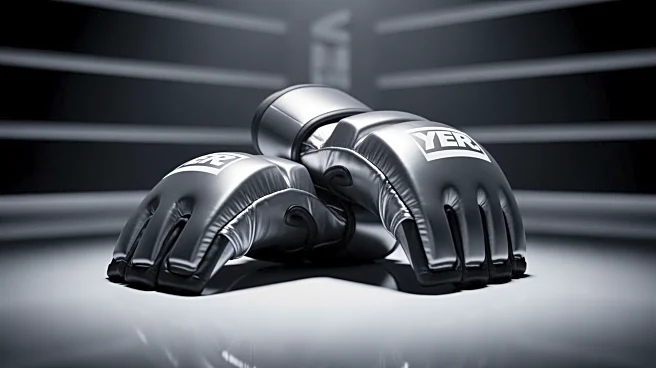What's Happening?
Jim Miller, a veteran UFC fighter, has voiced strong criticism against the UFC's handling of eye-pokes during matches, following a controversial incident involving Tom Aspinall. Miller argues that the current culture within the UFC fails to hold fighters
accountable for eye-pokes, which he believes could lead to severe injuries if left unchecked. He suggests that financial penalties, point deductions, or immediate suspensions could incentivize fighters to avoid such fouls. Miller emphasizes that while the gloves used in UFC may affect the ability to fully close the hand, they do not prevent fighters from partially closing their hands to avoid eye-pokes. He contrasts the UFC's approach with PRIDE FC, where immediate financial penalties and disqualification for fouls were enforced, resulting in fewer eye-pokes.
Why It's Important?
The issue of eye-pokes in UFC is significant as it raises concerns about fighter safety and the integrity of the sport. Miller's call for stricter penalties highlights the need for a cultural shift within the UFC to prioritize safety and accountability. Implementing financial penalties could deter fighters from committing fouls, thereby reducing the risk of serious injuries. This change could also enhance the sport's reputation by demonstrating a commitment to fair play and athlete welfare. The discussion around eye-pokes also reflects broader concerns about the enforcement of rules in combat sports and the balance between aggressive competition and safety.
What's Next?
If the UFC decides to adopt Miller's suggestions, it could lead to changes in the rule enforcement regarding eye-pokes. This might involve revising the penalty system to include fines or suspensions for fighters who commit fouls. Such changes could prompt discussions among fighters, officials, and governing bodies about the best practices for ensuring safety in the Octagon. Additionally, the UFC may need to consider adjustments to glove design or training protocols to further minimize the risk of eye-pokes. The response from the UFC and its stakeholders will be crucial in determining the future approach to handling fouls in the sport.
Beyond the Headlines
Miller's critique of the UFC's handling of eye-pokes touches on deeper issues within combat sports, such as the ethical responsibility of organizations to protect their athletes. The comparison with PRIDE FC suggests that cultural differences in rule enforcement can significantly impact fighter behavior and safety. This discussion may lead to broader conversations about the role of sports organizations in setting standards for athlete conduct and the importance of maintaining a balance between competitive intensity and safety. The potential for catastrophic injuries underscores the need for ongoing evaluation and adaptation of rules to safeguard participants.
















